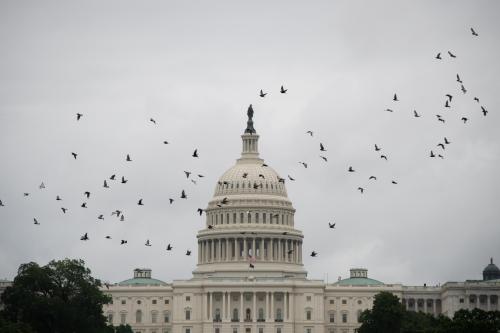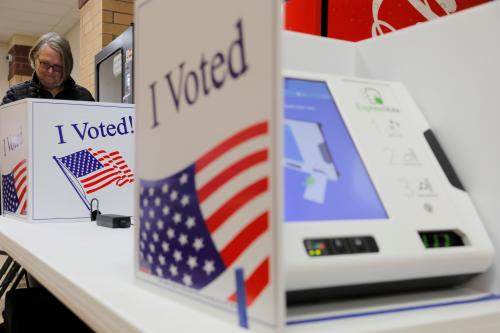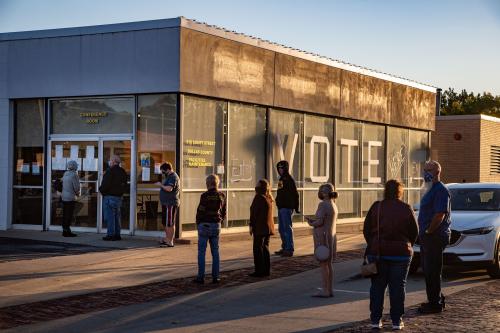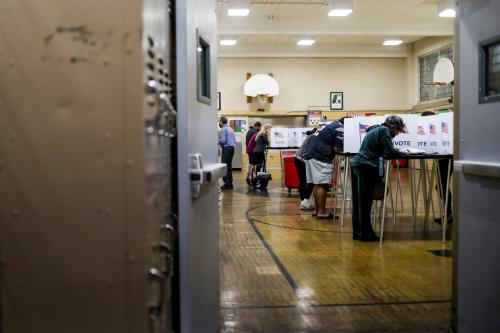Democrats were feeling pretty heady as they entered into the home stretch of the 2020 election cycle. Former Vice President Joe Biden was comfortably leading in both national polling and in many battleground states. Projections uniformly showed the party adding to its majority in the House of Representatives. Perhaps most improbably, Democratic party leaders increasingly believed they would be able to retake control of the Senate. One of the keys to accomplishing this feat was defeating four-term incumbent Susan Collins of Maine. The election results did not turn out exactly as the Democrats had hoped. While Biden did win the presidency, the party lost seats (but maintained its majority) in the House. As this is being written party control of the Senate hangs on the outcome of the two January runoff elections in Georgia. A big part of the reason Democrats’ hopes for Senate control rest with the relative long-shot goal of winning the two Georgia run-offs is that they were unable to defeat Collins. Not a single public poll in 2020 showed Collins with a lead in her race, and some polls showed the senator trailing her Democratic opponent, Sara Gideon, by double digits. Yet when the votes were counted, Collins beat Gideon by nine percentage points. How did this happen?
The primary argument Gideon and her supporters were making to Maine voters as to why they should turn Collins out of office was that she had changed over time, and not for the better. Indeed, “Not For You Anymore” was the title of one of the many attack ads Gideon and her supporters ran against Collins over the course of the campaign. Rather than the formerly very popular public servant who placed the interests of Mainers first, Collins had morphed into a Washington, D.C. insider who placed allegiance to President Trump, Senate Majority Leader Mitch McConnell, and most damningly out-of-state special interests ahead of everyday Maine residents. In order to keep her seat, Collins had to effectively counter these claims. The fact that she was reelected to a Maine-record fifth term in the Senate shows that she was able to do so.
The first part of this counter was drawing attention to Collins’ deep Maine roots. Collins regularly reminded voters that she was born and grew up in Caribou, in Maine’s northern and overwhelmingly rural Aroostook County and that her family there went back many generations. In the campaign’s closing weeks Collins reiterated time and time again that she was a Mainer through and through. Perhaps more importantly, Collins contrasted her deep Maine roots with the fact that Gideon was originally from Rhode Island and had only lived in Maine for about fifteen years. This might not be a big deal in many states, but in Maine where being “from away” marks a person as highly suspect in many quarters, this was huge.
The authentic “Maineness” of Collins as opposed to the “from awayness” of Gideon was further emphasized by the entry of retired longtime Maine television journalist Bill Green into the campaign as a surrogate for Collins. Green worked Maine’s NBC affiliates for almost 50 years, first covering sports and then more prominently as a features reporter covering all things Maine. His signature program, which ran for years statewide, was called “Bill Green’s Maine.” In early October the heretofore apolitical Green not only endorsed Collins, but made a series of highly effective television commercials on her behalf. One Mainer of enormous stature endorsing another—against an opponent who was not originally from the state—was a very important development in this race.
In his messages in support of Collins, Green also referenced the large number of questionable attack ads Gideon ran against and perhaps even more importantly, ads run by outside groups. Green made the argument that such a practice as very “unMaine-like,” a message that Collins also hammered home on the campaign trail. “That’s not how we do things here,” Collins regularly told crowds in the closing weeks of the campaign. This also served to mark Gideon as somewhat of an outsider, even though data from the Center for Responsive Politics show that enormous amounts of outside money came in both for (less so) and against (much more so) both candidates. The image of Gideon as a candidate supported by overwhelming amounts of money from outside groups making unfounded attacks on Collins undoubtedly hurt Gideon’s campaign.
Two additional themes Collins turned to down the stretch were her experience and lengthy track record of getting things done for the people of Maine. Collins routinely reminded voters of the fact that she has never missed a vote in her years in the Senate and also of the many programs and benefits she had brought to the state over the years. Collins painted Gideon as inexperienced in comparison. Collins informed crowds that she was next in line to chair the powerful Senate Appropriations Committee, and talked at length about her key role in writing the Paycheck Protection Program, a very popular element of the ongoing federal coronavirus relief efforts. Collins contrasted this with the fact that the Maine legislature—where Gideon was speaker of the House—had been adjourned since March, and therefore according to Collins doing nothing to help Mainers as they faced a global pandemic. Collins tied in a message of her trustworthiness here, and some outside groups supporting her compared this with the supposed untrustworthiness of Gideon. A key line of attack on this front involved Gideon’s actions as Speaker when a Democratic member of the Maine House was accused of inappropriate behavior with underage girls. Gideon’s attempts to respond here were largely ineffective.
In the end Collins was able to convince enough Maine voters that she was same person they had sent to the Senate four times before. She overcame a record amount of money spent against her and drew strong support from Republican and unenrolled voters. Collins carried 14 of Maine’s 16 counties, including five won by Joe Biden. But beyond the particulars of this race, we also need to look the last 30-plus years of statewide elections in Maine. If Gideon had been elected, she would have been the most liberal politician to win a statewide election in Maine since George Mitchell in 1988. Indeed, with one exception, the candidates who have won statewide elections in Maine since that time have all been relative centrists regardless of party—John Baldacci, William Cohen, Collins, Angus King (as both governor and senator), Janet Mills, and Olympia Snowe. The one exception here—conservative Republican Governor Paul LePage—won both of his terms in three-way races. Generally speaking, Maine does not elect overly ideological candidates to statewide office. Mainers maintained this practice in the 2020 by returning Susan Collins to the United States Senate.
The Brookings Institution is committed to quality, independence, and impact.
We are supported by a diverse array of funders. In line with our values and policies, each Brookings publication represents the sole views of its author(s).






Commentary
The political survival of Susan Collins
December 22, 2020